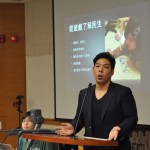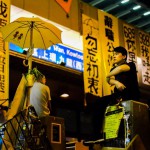Young people preserve the spirit of Occupy Movement by joining elections
By Natale Ching and Venice Lai
September 28, 2014 was the most unforgettable day in the 21 years of Wong Sui-lung’s life. On that day, the Hong Kong government fired 87 canisters of tear gas at non-violent protesters in Admiralty and set in motion what would become the 79-day Occupy Movement in Hong Kong.
Wong, who was a steward for Occupy Central with Love and Peace (OCLP), was enraged by the police’s use of excessive violence against unarmed protesters. But he was also heartened to see many friends he had thought were politically apathetic coming out to support the movement after the scenes broadcast on television. “When I saw that Central, Admiralty, Wan Chai, Causeway Bay and even Mong Kok were crowded with citizens striving for democracy, I started to believe that there is hope for Hong Kong,” says Wong.
Although the Occupy Movement eventually came to an end with the police clearing out the occupied sites and arresting the last protesters, its spirit continues in other forms. The movement awakened a whole generation of young people who stood up and voiced their strong desire for genuine democracy.
Initiated by a students’ class boycott campaign against the Standing Committee of the National People’s Congress (NPCSC)’s restrictive framework for electing Hong Kong’s Chief Executive by universal suffrage, the Occupy Movement grew to become the largest student-led protest in the history of Hong Kong.
The end of the occupation without winning any concessions from the government has left some participants struggling to find a way to extend and build upon its achievements. Some young people have set their sights on District Council elections later this year as a starting point for changing the established system and directly spreading the concept of democracy to communities across Hong Kong.
Wong Sui-lung – who quit his office job during the Occupy Movement – is now considering standing in the upcoming District Council elections. As a member of Umbrella Blossom, a group of former OCLP volunteers, Wong has been visiting districts like Sham Shui Po and Shatin to spread the spirit of the Umbrella Movement to local residents. Wong now spends most Sundays in Shatin, where he lives, setting up booths, distributing flyers and knocking on doors.
His work does not always go smoothly. Wong recalls confronting a group of residents with opposing views during one of his community visits in Sham Shui Po. Wong and his friends were scolded and accused of creating chaos by crowds who surrounded their booth. But by reasoning with them Wong managed to turn the dispute into a constructive discussion. “It’s actually not that bad,” he says. “Even if we can’t persuade them [the blue ribbons], when a group of people are listening…some neutral citizens may find our arguments reasonable.”
This experience motivated Wong to stand for election. He believes as a district councillor, he could make use of the district council’s resources to do community work without being heckled in the streets. Eventually, he hopes to change people’s mindsets and raise their awareness of and involvement in community affairs.
Wong is not fighting a lone battle. Early in November 2014, a group of netizens on the popular Golden Forum discussion site initiated a “2015 District Council” project to gather young people who are interested in contesting the polls. For each district, they have created Facebook and WhatsApp groups to exchange information and organised regular meetings to discuss their election campaigns.
Golden Forum netizen Kelvin Cheong Kok-man joined the Tung Chung District Council election support group after the Occupy Movement. Recently, he joined the campaign team and starting offering technical support to 21-year-old Sheep Wong Chun-yeung, who plans to stand in Tung Chung South.
Unlike Wong Sui-lung, Sheep Wong who works as a community development officer for the youth group, We are the Future Campaign, says he decided to stand because he is disappointed with the pan-democrats’ performance during the Occupy Movement. “Ever since that time when the pan-democrats asked us [the protesters] to retreat from Queensway, I have been utterly disappointed with all the pan-democratic parties,” says Wong. “They are like slaves and pessimists, giving in to everything as if they thought this servile method can really achieve something.”
The pro-Beijing Democratic Alliance for the Betterment of Hong Kong has held the Tung Chung South seat for 17 years. To compete, Wong plans to set up booths starting from 6 a.m. every day and organise activities like home visits. He believes the only way to defeat the pro-establishment camp’s handouts strategy (蛇齋餅糉) is to be more diligent and develop a good relationship with residents. “If they remember your name and you become part of their discussion, you have a chance of winning,” says Wong.
Witnessing young people’s political awakening in the Occupy Movement, 29-year-old Edward Lau Wai-tak has recently founded YOU®+, a non-profit organisation which assists prospective candidates under age 30 with no political background and who support genuine democracy – like Wong Sui-lung and Sheep Wong Chun-yeung – to run for the district council elections.

founder of YOU®+
Lau, who was a volunteer “defending” the barricades on the Occupy frontline, says he has raised HK$2 million through crowdfunding and can offer each candidate a maximum of HK$53,800. Apart from funds, the group can also provide assistance in the form of manpower, technical support and social connections. Lau says he will encourage young candidates not to compete with pan-democratic candidates but it will not be a requirement for support.
Lau is optimistic about the impact of the young people’s political participation. “Young people are innocent and idealistic. They are not bound by the responsibilities of work, therefore they can step forward,” says Lau. “At least they can change the atmosphere of the district council elections. More importantly, more people will vote in the elections.”
“We are also advocating young people to register as voters and [educating them] on the importance of the district council elections, hoping to motivate more people to vote. Only by doing this can we achieve democracy,” says Lau.
However, work as a district councillor can be more challenging than the young candidates might imagine. Veteran District Councillor Leung Yiu-chung has been serving Kwai Tsing district for 30 years. He agrees that maintaining a close relationship with residents is the key to winning the district council elections, but the situation is more complicated this time. His experience suggests that the Occupy Movement may be more of a hindrance than a help in the first large-scale election in the post-Occupy era.
“Recently when I visited the residents to help them install water savers, some of them told me that although they have been voting for me for many years, if I didn’t come that day, they wouldn’t vote for me again because I’m involved in the Occupy Movement,” Leung sighs.
Leung warns the young candidates to brace for the worst, and prepare for the possibility that they may be fighting a losing battle. Though it may seem nearly impossible to change people’s mindsets, he urges young people to persevere. “Running for district council elections is not like eating instant noodles. It takes time. And young people have a lot of time. Fail once, fail twice, fail thrice, it doesn’t matter. Treat it as an experience. Don’t just give up easily,” says Leung.
Ma Ngok, the head of the Department of Government and Public Administration at the Chinese University of Hong Kong, predicts that young candidates who join the district council elections after the Occupy Movement have little chance of winning. “Most districts are occupied by the pro-establishment camp, and there is at least one pan-democratic candidate working on each of the remaining districts,” says Ma.
Furthermore, he thinks unless these young candidates coordinate with pan-democratic candidates, the pro-democratic vote may be split and eventually lead to a lose-lose situation for both parties, making the pro-establishment camp the biggest winner in the district council elections.
Seeing that there is a slim chance of winning the district council elections, some young people, like Hong Kong Federation of Students Standing Committee member Tommy Cheung Sau-yin, are advocating alternative ways to preserve the spirit of the Occupy Movement. “Forming political parties makes the political demands of this generation more concrete, invoking a larger and broader political discussion,” says Cheung.
Cheung does not believe that joining the established system through district councils is an effective way to achieve political goals, as winning elections will take precedence over principles once young candidates become a part of the system. He cites the Hong Kong Association for Democracy and People’s Livelihood as an example, saying the party seldom talks about political reform and the Occupy Movement to avoid losing votes.
However, for Professor Eric Cheung Tat-ming from the Faculty of Law at the University of Hong Kong, joining the established system is an essential component of democracy. “Diversification and division of labour are important for democracy. We need to have different people taking up different roles,” says Cheung.

Sheep Wong Chun-yeung also believes that it is necessary for young people to join the established system to challenge the rules of the pro-establishment camp’s game. “You can’t beat them [the pro-establishment camp] unless you join the election. You must kick them away through votes,” Wong says firmly. “There is no turning back. We will go as far as we can.”
Fellow prospective candidate Wong Sui-lung frankly admits there is little chance for young candidates to win this year’s district council elections, but thinks defeat should not be the end of their path to democracy, but rather, the starting point. “We are not just focusing on this year, but maybe four or even eight years later. When we have changed the game rules, the pro-establishment camp’s handouts strategy on community work may collapse.”
“I believe if we follow this direction, Hong Kong people have the potential to upend the status quo,” says Wong.
Edited by John Cheng











































